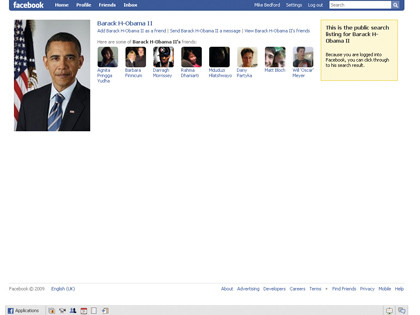5. Government eavesdrops on emails
The Theory: Project Echelon – a joint initiative by the British, American, Canadian, Australian and New Zealand governments – intercepts our phone calls, texts and emails. Powerful computers scan their content looking for certain incriminating keywords.
The government is keeping tight-lipped about this one, but, according to civil liberty campaigners the system can intercept satellite communications, snoop on mobile phones and tap into the public telephone system.

ECHELON IN ACTION: Worried civil liberties campaigners say that RAF Menwith Hill is a key element of a government spy network
PC Plus analysis: Quite frankly, after 9/11 and 7/7 it would be rather surprising if the American and British governments didn't intercept communications. The motive and the technology are both there.
6. Microsoft prolonged high-def format wars
The Theory: Microsoft fuelled the format war between HD DVD and Blu-ray. While consumers held off on buying either DVD replacement for fears of picking the wrong standard, the software giant planned to steal a march and launch a high-definition download service.
Sign up for breaking news, reviews, opinion, top tech deals, and more.
According to the theorists, Microsoft supported HD DVD even though it knew that Blu-ray would win in order to draw out the battle as long as possible.
In the meantime, their alternative – in the form of Windows Media Video 9 – would be brought to market allowing movies to be downloaded at up to 1,920 x 1,080 resolution.

FANNING THE FLAMES: Did Microsoft knowingly back HD DVD in the knowledge Blu-ray would win?
PC Plus analysis: Microsoft might have had cause to extend the format war, but if it did it wasn't a great success. Blu-ray sales are now starting to pick up, but Microsoft's download service is nowhere to be seen, and until average broadband speeds improve, it's barely practical for many. This one looks fanciful.
7. No code unbreakable for the CIA
The Theory: The US government has powerful computers that are vastly faster than the speediest known supercomputer and can crack any encoded message. In 2002, a 64-bit encoded message was cracked. It took 331,252 PCs working together for almost five years.
Today's 128-bit ciphers would take 18,446,744,073,709,551,616 times longer to crack, and the best experts can suggest is that by 2055 it would be possible to crack them using $42,000 billion worth of specialist hardware.
That would seem to derail this particular conspiracy theory, but if the US government manages to develop a practical quantum computer then even a 128-bit encrypted message would be instantly crackable.

STATE OF THE ART: Even the fastest modern computers struggle with 64-bit messages so we doubt they can crack everything
PC Plus analysis: The fact that any government would crave this capability is indisputable – but most experts agree that none of them has it. One thing's for sure: if the government had this technology then there's no way the CIA would shout about it. As a result, this is one theory that will run and run.
8. Google collects data on our surfing habits
The Theory: Every time we use Google, the words or phrases we enter are recorded so that the company can learn about our surfing habits. Whether your interests lie in the realm of politics or, shall we say, something more 'adult' in nature, our darkest secrets are laid bare.
Motives differ depending on who you listen to. Some say that Google sells the information to advertisers who inundate you with tailored spam. Others suggest that the security agencies are given tip-offs on people searching for bomb-making information.
PC Plus analysis: Google admits that it uses cookies to track your surfing habits and then processes this information to present you with relevant advertisements while you search. But the real crux of this theory is whether Google can link all that information to you as an individual. This is far more unlikely, as the company would need the cooperation of your ISP in order to identify you from your IP address. With all this in mind, we don't advise panicking just yet.
9. US government set up Facebook spy network
The Theory: DARPA (the US government's Defense Advanced Research Projects Agency) used funding to help set up Facebook so that it could use it to collect information on citizens. DARPA's former Information Awareness Office stated that its aim was to collect as much information as possible on everyone. Funding was cut following protests by civil rights activists, but it has been suggested that Facebook now fulfils these aims at no cost to the American taxpayer.

CIA-BOOK: Is Facebook just another CIA venture designed to collect data on the world's citizens? No
PC Plus analysis: There can be no better conspiracy theory than one in which the US government is the alleged antagonist, because one thing's for sure: these guys don't kiss and tell. On the face of it, the theory seems plausible, but we'd have to question the point of it – dissident US citizens surely wouldn't be so stupid as to use the social networking site as a hub for terrorist activity, and we doubt that the White House is interested in pictures documenting just how trashed college students got during Spring Break. Surely the CIA has developed better ways of collecting information on the people that it's interested in by now.
10. Conficker was written by the Chinese government
The Theory: The Conficker worm has received no shortage of publicity in recent months. According to some, it was written by the Chinese government as a test bed for advanced cyberwarfare.
Because its creators could upload new instructions to infected PCs, nobody knew what Conficker might be able to do – and that's what made it so scary. It also made it the stuff of conspiracy theories. In this particular one, the Chinese government will use it to bring the internet to its knees.
PC Plus analysis: This goes against the more conventional theory that suggests the Ukraine is the worm's source. The fact that it doesn't infect PCs with a Ukrainian keyboard layout might be a red herring, but virus expert Eugene Kaspersky is 60 per cent certain that Conficker does have its roots in the Ukraine.
He also believes that its purpose is less sinister than has been suggested. But before you dismiss this talk of cyberwarfare, we should point out the concept does have legs – the Georgian government accused Russia of perpetrating a cyberattack on official websites just before the country was invaded in 2008, and Estonia experienced a cyber blackout in 2007.
- 1
- 2
Current page: Govt reads your email, and 4 more conspiracies
Prev Page SETI is a smokescreen, and more